 Abengoa
Abengoa
Annual Report 2011
- Activities
- Activities
- Concession-type Infrastructures
- 2011 in Review
Transmission lines
Transmission assets are a core part of power infrastructure.
These infrastructures are becoming increasingly important given spiraling energy consumption, the widening gap between generation facilities and consumers, and the arrival of renewable power sources within the energy mix.
For many years Abengoa has been profiting from concessions of large power transmission systems, and this particular line of business is becoming increasingly important within the company.
The following projects have entered into operation this year:
Brazil:
- ATE IV line: 230 kV transmission line (TL) on the Canoinhas-São Mateus section brought online on 05/09/2011 and spanning 85 km.
- ATE VI line: Doña Francisca–Santa María TL section brought online on 17/08/2011. The 230 kV line spans 131 km.
- ATE VII line: second autotransformer at the Foz do Iguaçu Norte substation, which entered into service on 13/08/2011.
Peru:
- ATN – Carhuamayo-Cajamarca TL: the following sections of the line are now operating commercially:
- Section I – Carhuamayo-Paragsha TL, brought online in January 2011.
- Section II – Paragsha-Conococha and upgrades to the Cajamarca substation, commissioned in February 2011.
- Section IV – Kiman Ayllu-Cajamarca, commissioned in June 2011.
- Section III – Conococha-Kiman Ayllu, commissioned in December 2011.
Highlight projects for the year included the following:
-
The most important milestone in 2011 for Abengoa’s transmission line concessions division was the alliance forged with Cemig (Compañía de Energía de Minas Gerais) through its subsidiary company Taesa (Transmisora Alianza de Energía S.A.), in which each company now holds a 50 % stake in the STE, ATE, ATE II and ATE III concessions, all located in Brazil. In addition to generating considerable value, the agreement strengthens Abengoa’s position in the Brazilian market and will help to drive growth in the region. The assets covered by the arrangement span a total of 2,518 km and have been operating for five years on average. Of this grand total, Abengoa will continue to manage 2,138 km through a joint venture with Cemig, thus enabling it to continue expanding its power line business in Brazil and other Latin American countries.
-
Abengoa secured the corresponding contract from ANEEL (Brazilian National Electrical Energy Agency) and the assets were gradually entered into service between 2004 and 2008. Abengoa was awarded a contract to operate a new power transmission line in Brazil, specifically the 230 kV C3 Itacaíunas – Carajás line in the state of Pará in the north of the country. The line, which runs parallel to another line in the same region managed by the company ATE III Transmissora de Energía, will meet industrial power demands in Carajás.
-
In Peru, Abengoa successfully secured a contract for the ATN 2 Las Bambas-Cotaruse transmission line. The agreement extends the company’s network of concessions in the country by a further 130 km for 18 years.
Solar power
In 2011, Abengoa continued to showcase and consolidate its international leadership in the solar power sector, climbing to 443 MW in operation, 1,060 MW under construction and 150 in pre-construction or advanced development.
The main milestones in 2011 were as follows:
- In Spain, the company commissioned the Helioenergy 1 and 2 facilities, two 50 MW parabolic-trough plants operating at the Ecija solar complex. E. On and Abengoa hold equal 50 % stakes in the venture.
In addition, the two power tower plants (PS10 and PS20) are currently operating at full efficiency, as are the three parabolic trough plants (Solnova 1, Solnova 3 and Solnova 4) and the five photovoltaic plants (Sevilla PV, Casaquemada, Las Cabezas, Copero and Linares). As the facilities have been in service for over a year, Abengoa has been able to make a number of procedural and operational improvements, which are being incorporated into the new solar platforms.
Also in 2011, construction continued on a further eight 50 MW facilities.
- In the United States, considerable progress has been made on the 280 MW Solana plant in Arizona, one of the world’s largest solar facility. In addition, the newer 280 MW Mojave solar plant received a federal loan guarantee from the US government, enabling the company to secure financing for the project and commence construction. In other regions, the 150 MW integrated solar combined cycle (ISCC) facility in Algeria was successfully commissioned, while construction continued on the 100 MW Shams-1 plant in Abu Dhabi.
- In addition, a 14 MW solar field is currently under construction for a 480 MW hybrid electrical power plant in Aguas Prietas (Mexico), which will feature Abengoa technology.
- The South African Department of Energy selected Abengoa to carry out two projects: a 100 MW parabolic-trough plant and a 50 MW power tower plant utilizing superheated steam.
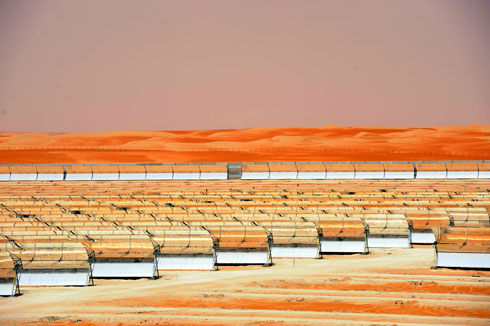
Shams-1 (Abu Dhabi, United Arab Emirates)
On a final note, Abengoa continues to be involved in the Desertec Industrial Initiative, which seeks to promote a stable framework for developing renewable energies in desert areas of North Africa and the Middle East for local consumption and exports to Europe.
Desalination
Abengoa currently has five projects under concession. The desalination plants in Skikda (Algeria) and Chennai (India), both with a treatment capacity of 100,000 m3/day and in operation and under maintenance since the end of 2009 and middle of 2010, respectively, are continuing to match expected performance output. The company has been able to use the experience gained from these two projects under concession to improve its R&D&I programs and its other plants under development.
August witnessed partial acceptance of the component units for the Honaine desalination plant, boasting a capacity of 200,000 m³/day and awarded by the public company Algerian Energy Company (AEC). This marks a major milestone in the project, as it demonstrates the plant’s capacity to generate the committed volume of water in terms of both quantity and quality. In addition, the company initiated the process leading to final acceptance of the entire plant and commencement of the operation and maintenance phase, both scheduled for mid-2012.
In Spain, the Bajo Almanzora desalination plant in Almeria was unveiled at the start of September. The facility has a treatment design capacity of 60,000 m3/day. It is the third plant that the company currently operates in Spain, alongside Almeria (50,000 m3/day) and Cartagena (65,000 m3/day).
In Africa, Abengoa has signed a contract with the public water utility Ghana Water Company Limited (GWCL) to construct a 60,000 m3/day capacity seawater desalination plant in Nungua. The facility will be constructed under a DBOO(T) contract (Design, Build, Own, Operate and maintenance for 25 years, plus possible Transfer). The proposed desalination plant marks a major step forward on the path to improving hydro installations for the supply of drinking water in Ghana, a country experiencing sharp growth in population. The capital city, Accra, which has a population of roughly three million, is finding it difficult to cope with the demand of surrounding towns and villages. The new facility will help to supply water to nearby towns and cities such as Teshie Nungua and Tema. The project has been welcomed by both the Ghanaian authorities and the local population seeing as though it is the first desalination plant in the country and in West Africa as a whole. It has also attracted considerable attention from investors, particularly from the Japanese investment firm Sojitz, with whom Abengoa signed a shareholders’ agreement at the end of September to formalize its equity stake in the venture.

Signing of the collaboration agreement with Dalian authorities (China)
In June, Abengoa signed an agreement with the local Dalian authorities for the joint development on Changxing Island (China) of a desalination program to supply water to the local industries and urban hubs envisaged in the development plan for Dalian Changxing Island (DCI). The project will bring a total capacity of 800,000 m3/day to the area for the coming 10 years. Also Abengoa has reached an agreement with the company Hitachi to develop phase one of the project.
Abengoa completed the design and construction in July of the Donna facility in Hidalgo County (Texas). The contract for the plant, with can treat up to 7,500 m3/day, was awarded by the state’s largest water supply utility, North Alamo Water Supply, and has been completed within budget and several months ahead of schedule. The operation and maintenance of the plant, which was formalized through a separate agreement, got under way in December.
In April, the company sponsored the Global Water Awards gala dinner, organized by Global Water Intelligence, a leading analyst of the international water market. Many big names attended the event, including the former Secretary-General of the UN, Kofi Annan, who handed out the awards to the winning companies, projects and technologies for the year.

Abengoa sponsored the Global Water Awards in Berlin
Abengoa participated in the IDA World Congress 2011 in Perth (Australia). The biannual congress, which took place in September, was organized by the International Desalination Association, an internationally recognized body within the desalination sector. Under the motto “Sustainable solutions for a thirsty planet”, the event brought together over 900 delegates from 60 countries to discuss technical concerns and share knowledge and experience.

Abengoa at the IDA World Congress 2011 held in September in Perth (Australia)
Cogeneration and other concessions
Cogeneration technologies generate electricity and high-temperature heat in tandem for use in industrial processes; an energy-efficient solution being spearheaded by Abengoa.
Heat and electricity are generated from biomass, natural gas or industrial waste for subsequent use in industrial processes, with the surplus sold to the grid.
Abengoa currently has various cogeneration plants:
- Cogeneración Villaricos, S.A. (Covisa), Enernova Ayamonte, S.A. (Enernova) and Aprovechamientos Energéticos Furesa, S.A. (Aprofursa). These three companies generate electrical power while using the resulting heat to produce water or steam. The electricity is then sold, while the heat is used by the host factory.
- Procesos Ecológicos Vilches: company specializing in the recycling of livestock waste to produce fertilizer and electrical power through a slurry treatment plant (pig waste, mixed excrement, urine, water, leftover animal feed and other foreign bodies), combined with a electrical power cogeneration plant.

Procesos Ecológicos Vilches cogeneration plant
- Nuevo Pemex: 300 MW plant to be constructed at the facilities of Petróleos Mexicanos (Pemex), the first to be integrated into one of its existing refineries. The power plant is capable of generating electricity and thermal energy through two gas turbine generators with their respective electric generators, and two heat recovery steam generators.
Abengoa also manages a number of other concessions:
- Centro Cultural Mexiquense (cultural center). The complex sits on 17 ha of land and boasts 35,000 m2 of museums, libraries, workshop modules with over 60 classrooms intended for a range of different art-related subjects, an administrative building, auditoriums, an open-air theater, a concert hall with seating for 1,200 people, a cafeteria, a restaurant and parking for over 1,000 vehicles.
- Irrigation zone of the Navarra Canal. The intention with this concession is to recover investment by levying an irrigation charge.
- Cerrato hydroelectric power plant on the river Pisuerga and mini-stations along the Aragon and Catalonia irrigation canal. Foot-of-dam, run-of-river and diversion plants in northern Spain. Investment here is recovered by selling the electricity generated by the plants.
- Hospitals: operation of parking facilities at the Costa del Sol hospital (Malaga), with Abengoa having already completed construction of the hospital building. The complex is a further example of the company’s concessions in operation, which also include the Tajo hospital in Aranjuez (Madrid).
- The company also operates three courthouses in Catalonia: the courthouse of Olot in the province of Gerona and the courthouses of Cerdañola and Santa Coloma in the province of Barcelona.
The following major milestones were reached in 2011:
- All generation systems at Abengoa’s Campus Palmas Altas headquarters in Seville were in full operation in 2011. These systems are:
- A trigeneration system (CCHP) comprising a 1 MW gas-powered engine-generator, an absorption chiller, a heat exchanger and hot water accumulator tanks, capable of generating electrical and thermal power and cooling.
- A 100 kWth parabolic-trough system, also featuring an accumulator tank, absorption chiller and pumping system, which produces cold water from solar power.
- Photovoltaic plants integrated by means of pergolas forming part of the campus’ architecture, with an installed capacity of 152.5 kWp.
- A 10 kW high-concentration photovoltaic panel with dual axis tracking, featuring state-of-the-art solar modules and three single-phase inverters. The electrical power generated by this panel is passed through an electrolyzer to produce hydrogen during the day. This is then used by a 1.2 kW fuel cell to generate electrical power at night, thus powering part of the indoor lighting system of the campus.
- Further inroads into the wind power sector after the Uruguayan National Authority for Power Generation and Transmission (UTE) awarded Abengoa a contract to construct and exploit the 50 MW Peralta wind farm in Uruguay.
- Also within the wind sector, Abengoa took part in an auction staged by Aneel (National Electrical Energy Agency) in Brazil and came away with contracts for three future wind farms to be built in the state of Ceará, Brazil, as part of the Trairí II wind complex, which will boast a total installed capacity of 96.6 MW.
- Abengoa awarded a 25-year contract to supply drinking water, with the project including not only the engineering and construction, but also operation, repair and maintenance of the El Zapotillo-Los Altos de Jalisco-León aqueduct in Guanajuato, Mexico.
- Unveiling of the Centro Cultural Mexiquense de Oriente (CCMO) cultural center, Abengoa’s first concession in Mexico. The building, which is a huge boon for the eastern metropolitan area of Mexico City, was constructed in just 18 months and will now be operated over a 20-year term before finally being handed back to the IMC (Mexican Institute of Culture).
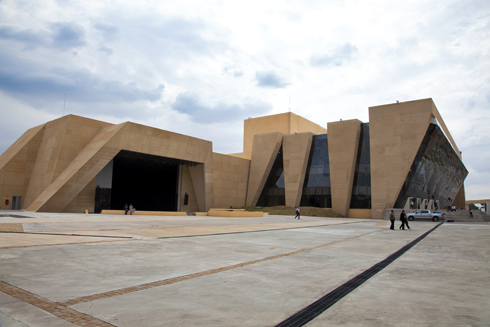
Concecutex Outside view of the Centro Cultural Mexiquense de Oriente cultural centre (Mexico)
- Work is continuing on the 300 MW cogeneration plant in Tabasco (Mexico), which will be built at the existing facilities of the state-owned company Petróleos Mexicanos (Pemex). The project includes operation and maintenance for a 20-year term. The new facility will be able to generate up to 800 t/h of steam to supply electricity to the Nuevo Pemex Gas Processing Complex in Tabasco, and will feed surplus power to the Mexican power grid.
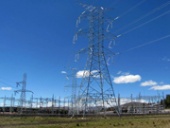
TL concession, Carhuamayo, Paragsha, Conococha, Huallanca, Cajamarca, Cerro Corona, Carhuaquero 220 kV TL Conococha – Kiman Ayllu L4 Norte – Arrival at the Cajamarca Norte substation, Peru
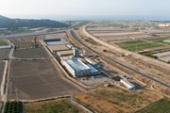
Bajo Almanzora desalination plant (Almeria)
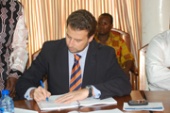
Signing of the water purchase agreement for the future Nungua desalination plant (Ghana)
© 2011 Abengoa. All rights reserved
